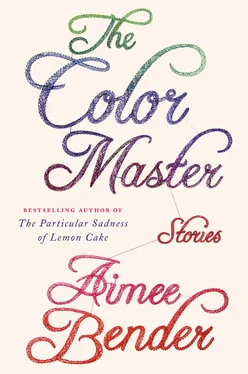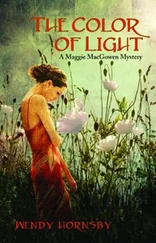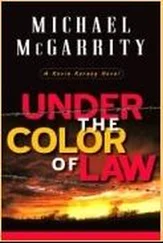We walked for fifteen minutes, and at times the man from the podium, now with a megaphone, would call out “Murderers!” and the crowd would respond “Yes!” and then the feet would pick up. I hid my face in my scarf.
On campus a few weeks earlier, there had been a real protest, a sincere protest, one I had attended with Arlene, who did seem able to remember that we were at war and had adopted a soldier online to whom she sent electrolyte-enhanced water and peanut butter cups and moisturizer for the desert. She wrote him long letters in response to his letters and once even spoke to his wife on the phone to make it clear she was not flirting. “I have a great boyfriend,” I heard her say, as I was walking into the room to retrieve my latest attempt at the crossword. “Fred.” She was tugging at a curl, and her brow was furrowed with concentration and concern. “I truly mean no disrespect,” she said. At that sincere protest, with Arlene shouting next to me, our shouts visible in puffs of cold, I’d felt a momentary crush of panic, like for one second I got it, grasped the stakes, understood that people my age were living a completely different and precarious life on my watch, but then it was over and the crowd dispersed and we went to have potato skins at the food co-op. “But what’s a person to do?” I’d asked Arlene, scooping up fake bacon bits with a bit of crisped peel. “Give up everything?”
She dabbed her mouth with a napkin. It was just the two of us. Fred was away at a track meet in Akron.
“No-o,” she said, slowly. “Give up something?”
At this second rally, I continued to follow the sleeping-bag twins as they rustled along the sidewalk. This protest had a completely different feel than the last one, more like we were sleepwalking into a dream where death was only a Jungian symbol made into a colorful illustration on a tarot card. It was, by now, probably ten-thirty, and the regents were asleep in their white houses. We walked off campus, down a residential street to an empty dirt lot buttressed by two tract homes. Soon the lot would grow a house that exactly matched the ones on either side.
“Go!” said the man with the megaphone.
It was like watching a dance in slow motion. As if they’d all planned it in advance, which clearly most of them had, the marchers began shedding their clothes. The night was thirty or forty degrees, probably less, but off came the sleeping bags, the sweatshirts, the hats, the scarves, the shoes. I wasn’t sure what any of it had to do with dead soldiers, but it certainly was interesting. “Off!” yelled the man, and soon there were over a hundred naked coeds, their clothes in heaps. “Show your true selves!” he yelled, and they put their bodies on the lot, which I now realized was probably the largest plot of dirt around, since the campus was covered in concrete, brick, and grass, and all the students rolled in the dirt—“This is what we need!” he said—and they were rolling, and kissing, and kicking aside clothes, and warming up skin on skin, and shivering, trying to reclaim a decade long past. I was now standing in the veranda of the next-door neighbor’s house, which, as far as I could tell, had a still-up neighbor in it, due to the flickering light of the flat-screen TV I could see through sheer white curtains. Did the neighbor know that one hundred nubile twenty-year-olds were rolling in the dirt next door? I thought not. It seemed he was watching Law & Order .
The man with the megaphone backed off. He watched the bodies rolling and reaching. He watched piles of bodies start kissing. He saw me over in the veranda and glanced at me for a moment, I suppose to see if I was the type to tell. And it seemed he decided no, because then he began to pick his way through the bodies and clothing and with nimble, practiced fingers lifted over fifty wallets from the stack, tossing them into his backpack. Sighs and grunts erupted around him as he threaded through the piles and then tiptoed away. He’d read me right; I didn’t say a word. It seemed, in its way, a fair exchange.
When I woke up, the lot was clear. No naked bodies, no police, just one leftover sock in the dirt, lit by the white disc of moon. I’d fallen asleep sprawled out on the porch with my scarf wrapped tightly over my head. It was cold out, but tiredness had overtaken me, swallowed me, as it sometimes did, and so I hadn’t gotten to see the marchers finishing, or getting dressed, or yelling about their wallets.
I blew on my hands. Stretched. The whole elaborate thing—from protest to empty lot—had done nothing but make me irritable. There were real deaths happening, after all. Hard to imagine from our dorm apartments and fifty-minute course lectures. And on a pettier and slightly more distracting level, I also didn’t like having stood, as always, so everlastingly, to the side. I was certainly not doing my share to help out the world in any way, and neither was I doing my share by having fun as a naked college coed. I was basically sleeping through all of it. Was I really a nothing-doer, an apathetic blob? Was Arlene right? She planned most of our weekend activities. She adopted the soldier and called the wife. She had sex with Fred. When people danced at weddings, I would stand on the side grimacing, but not because I did not want to dance. I just couldn’t seem to. Cousins and happy types would cheerfully grab my hands and draw me into the center, but even with that encouragement, with smiles like fields of daisies surrounding, I could only make it through half a song. The magnet inside the wall was too strong. I liked Julian, tucked in his documentary office; he was the perfect boyfriend for me, similar to that magnet—someone I could not touch but who, with a pull from beneath a surface, still kept me from the activities at hand.
This all left me so cold and cranky that I decided right then and there to make something happen, because it is always possible to make something happen, and there was no reason that I had to go home right then with my hands jammed in my pockets and say hi to Arlene and Fred all cuddled up warm watching late-night comedy TV with their hair so mussed and gleaming and not have participated in anything myself. It was this reason, and perhaps others I did not understand, that led me to turn to the front door of the house attached to the porch upon which I was standing, square my shoulders, and knock.
By then it was well after midnight. The same flicker of TV light still broke against the windowpanes, but I didn’t even know if the watcher was awake until he quickly bounded up to the door.
“Yes?” said the voice, through the door. A male voice: reedy, elderly.
“I’m sorry to bother you,” I said. “Did you see what happened?”
“Something happened?” He pulled back the flimsy curtains that covered the window in the center of the door. He was an older man, probably close to sixty-five. Whitish hair. Bushy eyebrows that could’ve commanded authority but on his face brought to mind squirrels and hairbrushes. He could’ve been my grandfather, except my grandfathers were robust men, who strode through the world and stepped on people, including both of my parents.
“A hundred people were robbed right next to you,” I said, through the glass. “While having sex.”
“Robbed?” He looked startled. “Here? Sex?”
“While you were watching Law & Order ,” I said.
He let go of the curtain and opened the door. He was shorter than I was. Although I was female and he male, I felt very clearly that I was the threat in this situation.
“Did someone call the police?” he said. “Are you a student?”
“No police,” I said, waving behind me, at the dark emptiness. “I’m a student.”
He stared. He was observing me as keenly as I was observing him. I could see the observations floating through his face, him observing, me observing him observing.
Читать дальше












